Auditing Principles Report: Independence, Risks, and Case Studies
VerifiedAdded on 2020/05/16
|12
|2894
|302
Report
AI Summary
This report delves into the core principles of auditing, with a specific emphasis on auditor independence and its critical role in ensuring the reliability and objectivity of financial statements. It explores the various risks inherent in the audit process, including inherent risks, business risks, and the risk of material misstatements, highlighting how these factors can impact the effectiveness of an audit. The report also examines the concept of risk-based auditing, emphasizing its advantages over traditional methods. Furthermore, it provides a literature review on the importance of auditor independence and its relationship with corporate governance. The report includes case studies of accounting scandals, such as Enron and Worldcom, to illustrate the consequences of compromised auditing practices and the importance of maintaining ethical standards and robust internal controls. Overall, the report aims to provide a comprehensive understanding of auditing principles and their practical implications in the real world.
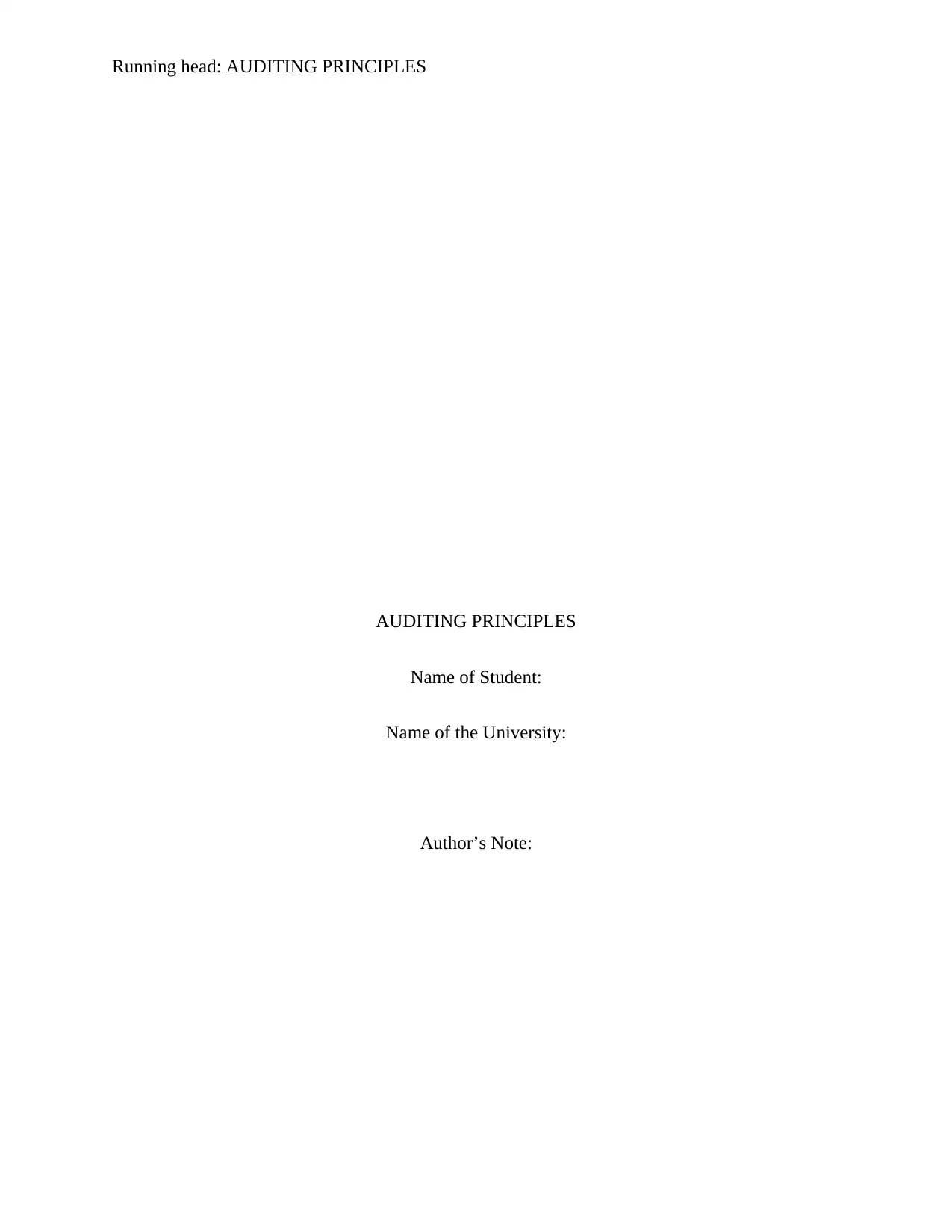
Running head: AUDITING PRINCIPLES
AUDITING PRINCIPLES
Name of Student:
Name of the University:
Author’s Note:
AUDITING PRINCIPLES
Name of Student:
Name of the University:
Author’s Note:
Paraphrase This Document
Need a fresh take? Get an instant paraphrase of this document with our AI Paraphraser
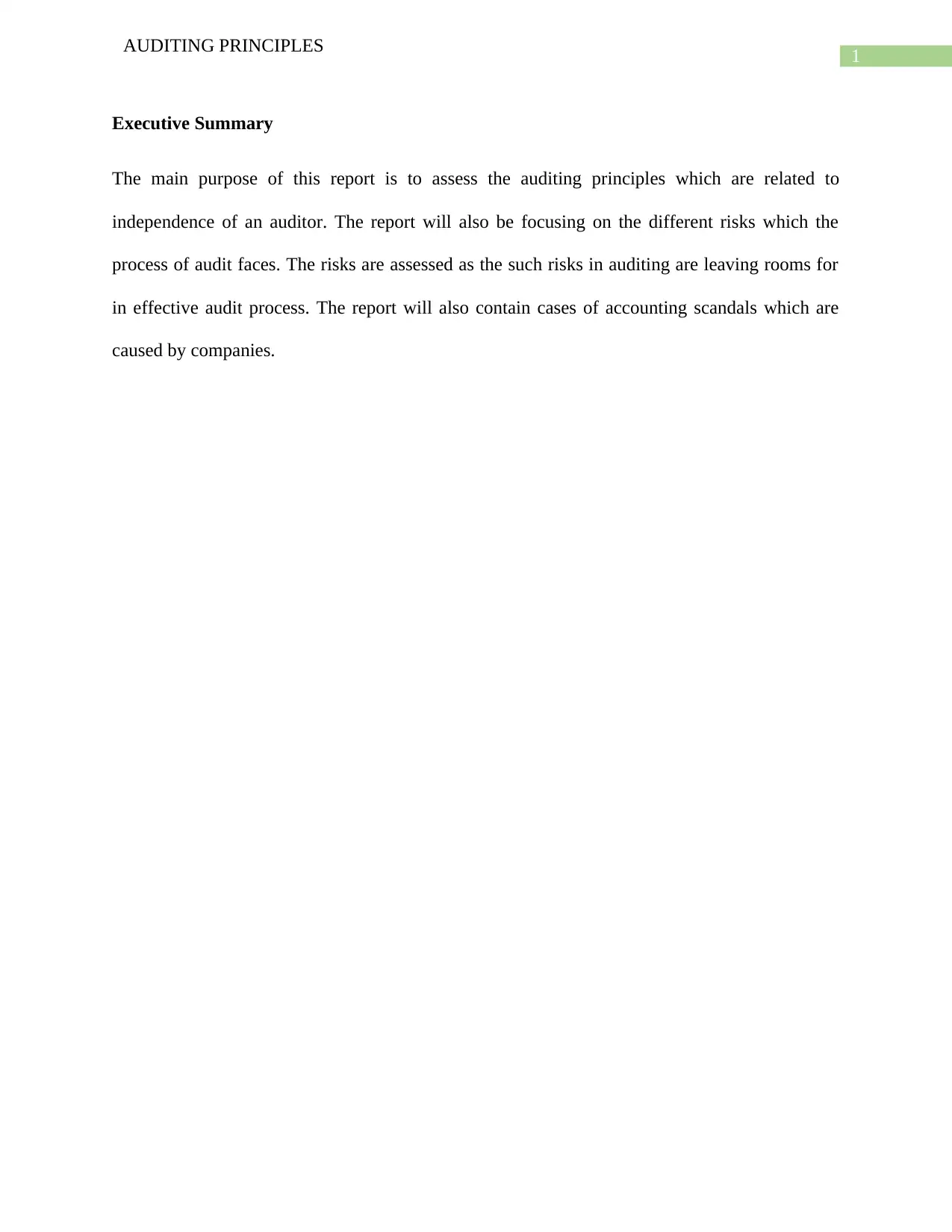
1
AUDITING PRINCIPLES
Executive Summary
The main purpose of this report is to assess the auditing principles which are related to
independence of an auditor. The report will also be focusing on the different risks which the
process of audit faces. The risks are assessed as the such risks in auditing are leaving rooms for
in effective audit process. The report will also contain cases of accounting scandals which are
caused by companies.
AUDITING PRINCIPLES
Executive Summary
The main purpose of this report is to assess the auditing principles which are related to
independence of an auditor. The report will also be focusing on the different risks which the
process of audit faces. The risks are assessed as the such risks in auditing are leaving rooms for
in effective audit process. The report will also contain cases of accounting scandals which are
caused by companies.
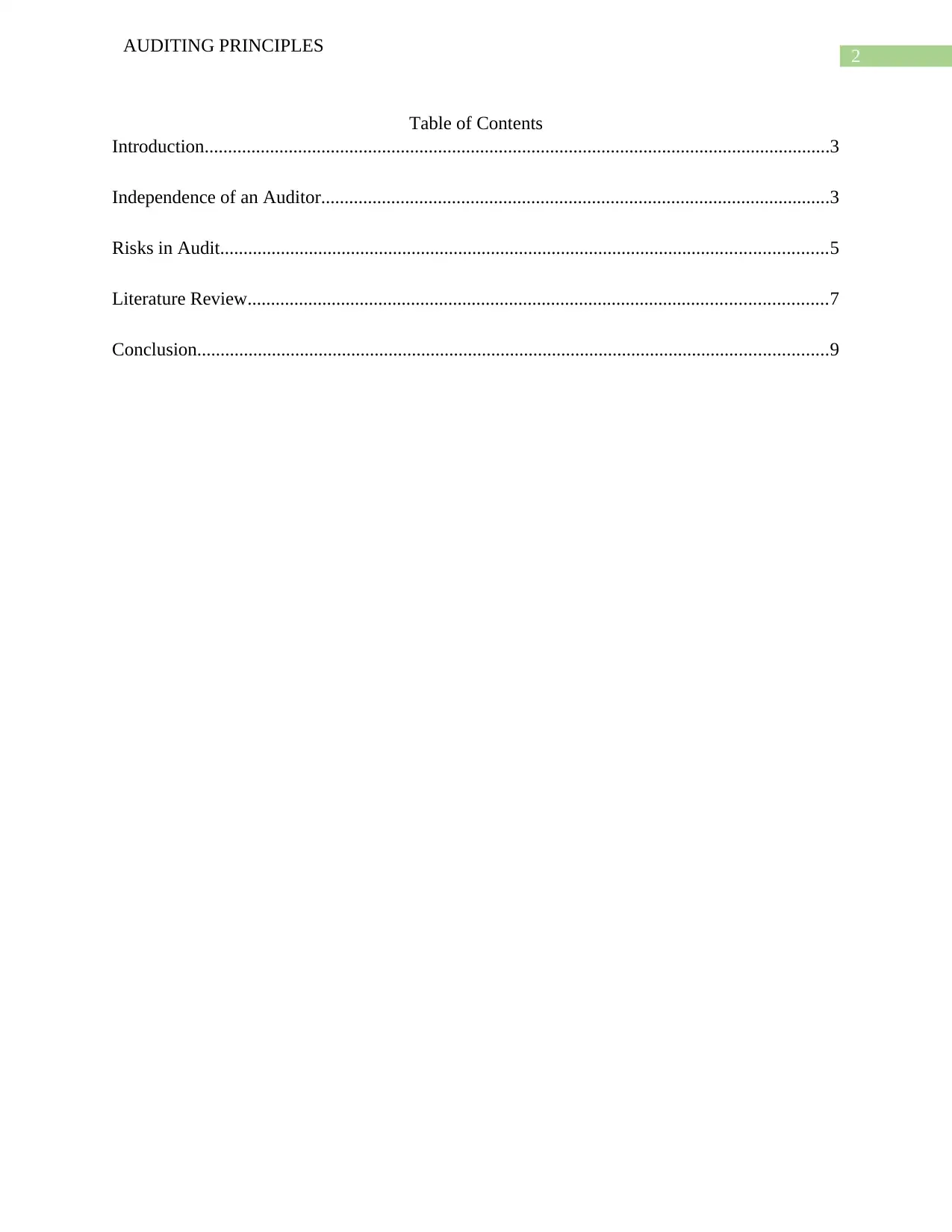
2
AUDITING PRINCIPLES
Table of Contents
Introduction......................................................................................................................................3
Independence of an Auditor.............................................................................................................3
Risks in Audit..................................................................................................................................5
Literature Review............................................................................................................................7
Conclusion.......................................................................................................................................9
AUDITING PRINCIPLES
Table of Contents
Introduction......................................................................................................................................3
Independence of an Auditor.............................................................................................................3
Risks in Audit..................................................................................................................................5
Literature Review............................................................................................................................7
Conclusion.......................................................................................................................................9
⊘ This is a preview!⊘
Do you want full access?
Subscribe today to unlock all pages.

Trusted by 1+ million students worldwide
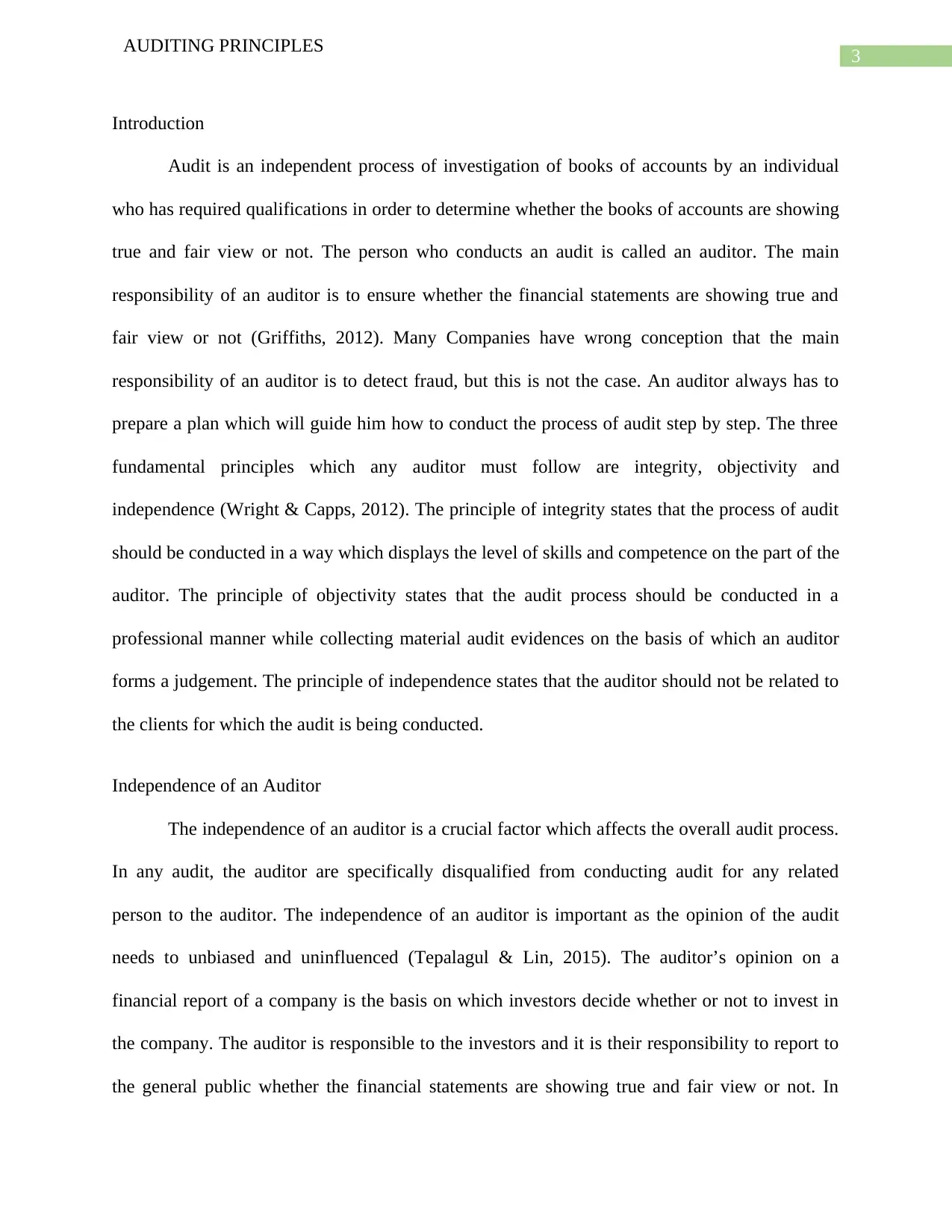
3
AUDITING PRINCIPLES
Introduction
Audit is an independent process of investigation of books of accounts by an individual
who has required qualifications in order to determine whether the books of accounts are showing
true and fair view or not. The person who conducts an audit is called an auditor. The main
responsibility of an auditor is to ensure whether the financial statements are showing true and
fair view or not (Griffiths, 2012). Many Companies have wrong conception that the main
responsibility of an auditor is to detect fraud, but this is not the case. An auditor always has to
prepare a plan which will guide him how to conduct the process of audit step by step. The three
fundamental principles which any auditor must follow are integrity, objectivity and
independence (Wright & Capps, 2012). The principle of integrity states that the process of audit
should be conducted in a way which displays the level of skills and competence on the part of the
auditor. The principle of objectivity states that the audit process should be conducted in a
professional manner while collecting material audit evidences on the basis of which an auditor
forms a judgement. The principle of independence states that the auditor should not be related to
the clients for which the audit is being conducted.
Independence of an Auditor
The independence of an auditor is a crucial factor which affects the overall audit process.
In any audit, the auditor are specifically disqualified from conducting audit for any related
person to the auditor. The independence of an auditor is important as the opinion of the audit
needs to unbiased and uninfluenced (Tepalagul & Lin, 2015). The auditor’s opinion on a
financial report of a company is the basis on which investors decide whether or not to invest in
the company. The auditor is responsible to the investors and it is their responsibility to report to
the general public whether the financial statements are showing true and fair view or not. In
AUDITING PRINCIPLES
Introduction
Audit is an independent process of investigation of books of accounts by an individual
who has required qualifications in order to determine whether the books of accounts are showing
true and fair view or not. The person who conducts an audit is called an auditor. The main
responsibility of an auditor is to ensure whether the financial statements are showing true and
fair view or not (Griffiths, 2012). Many Companies have wrong conception that the main
responsibility of an auditor is to detect fraud, but this is not the case. An auditor always has to
prepare a plan which will guide him how to conduct the process of audit step by step. The three
fundamental principles which any auditor must follow are integrity, objectivity and
independence (Wright & Capps, 2012). The principle of integrity states that the process of audit
should be conducted in a way which displays the level of skills and competence on the part of the
auditor. The principle of objectivity states that the audit process should be conducted in a
professional manner while collecting material audit evidences on the basis of which an auditor
forms a judgement. The principle of independence states that the auditor should not be related to
the clients for which the audit is being conducted.
Independence of an Auditor
The independence of an auditor is a crucial factor which affects the overall audit process.
In any audit, the auditor are specifically disqualified from conducting audit for any related
person to the auditor. The independence of an auditor is important as the opinion of the audit
needs to unbiased and uninfluenced (Tepalagul & Lin, 2015). The auditor’s opinion on a
financial report of a company is the basis on which investors decide whether or not to invest in
the company. The auditor is responsible to the investors and it is their responsibility to report to
the general public whether the financial statements are showing true and fair view or not. In
Paraphrase This Document
Need a fresh take? Get an instant paraphrase of this document with our AI Paraphraser
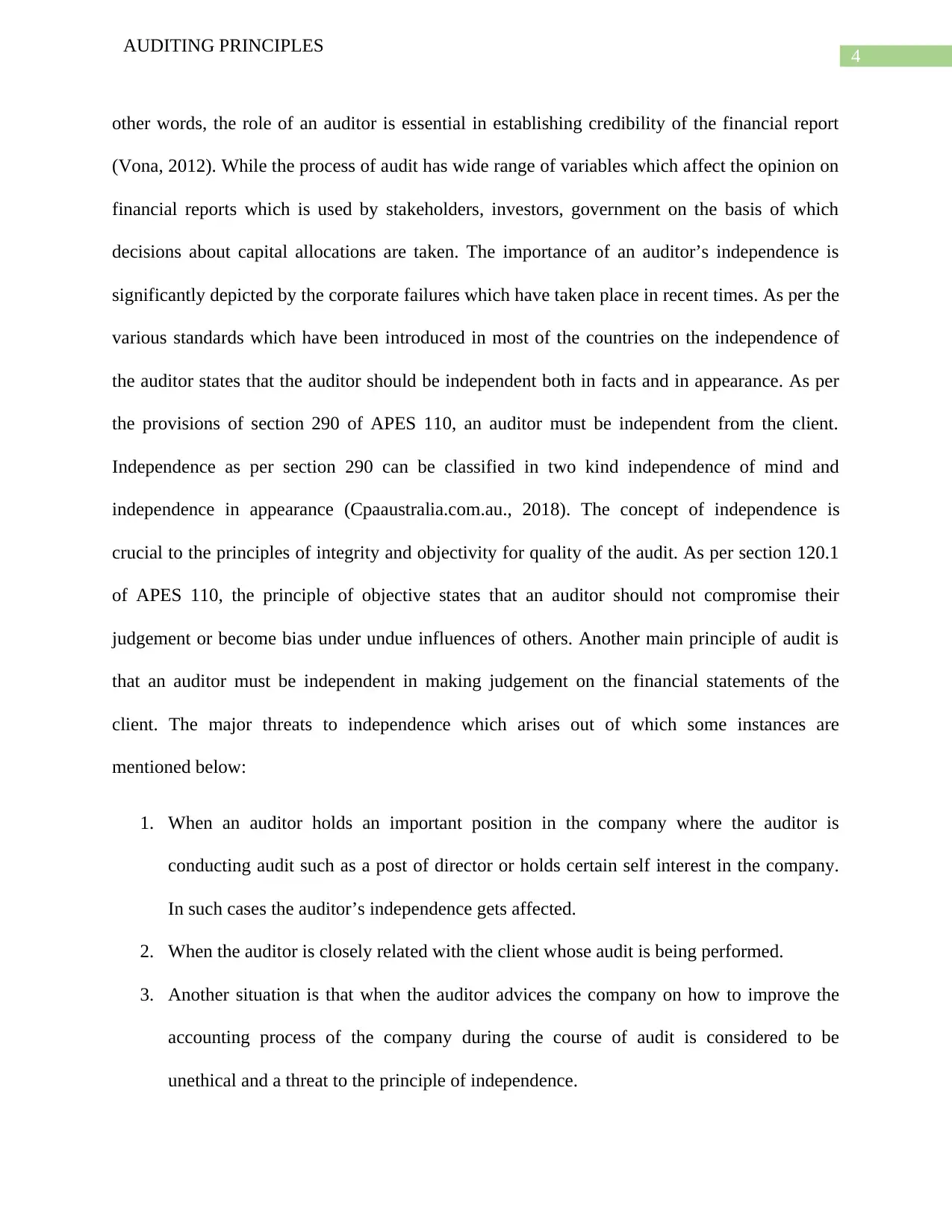
4
AUDITING PRINCIPLES
other words, the role of an auditor is essential in establishing credibility of the financial report
(Vona, 2012). While the process of audit has wide range of variables which affect the opinion on
financial reports which is used by stakeholders, investors, government on the basis of which
decisions about capital allocations are taken. The importance of an auditor’s independence is
significantly depicted by the corporate failures which have taken place in recent times. As per the
various standards which have been introduced in most of the countries on the independence of
the auditor states that the auditor should be independent both in facts and in appearance. As per
the provisions of section 290 of APES 110, an auditor must be independent from the client.
Independence as per section 290 can be classified in two kind independence of mind and
independence in appearance (Cpaaustralia.com.au., 2018). The concept of independence is
crucial to the principles of integrity and objectivity for quality of the audit. As per section 120.1
of APES 110, the principle of objective states that an auditor should not compromise their
judgement or become bias under undue influences of others. Another main principle of audit is
that an auditor must be independent in making judgement on the financial statements of the
client. The major threats to independence which arises out of which some instances are
mentioned below:
1. When an auditor holds an important position in the company where the auditor is
conducting audit such as a post of director or holds certain self interest in the company.
In such cases the auditor’s independence gets affected.
2. When the auditor is closely related with the client whose audit is being performed.
3. Another situation is that when the auditor advices the company on how to improve the
accounting process of the company during the course of audit is considered to be
unethical and a threat to the principle of independence.
AUDITING PRINCIPLES
other words, the role of an auditor is essential in establishing credibility of the financial report
(Vona, 2012). While the process of audit has wide range of variables which affect the opinion on
financial reports which is used by stakeholders, investors, government on the basis of which
decisions about capital allocations are taken. The importance of an auditor’s independence is
significantly depicted by the corporate failures which have taken place in recent times. As per the
various standards which have been introduced in most of the countries on the independence of
the auditor states that the auditor should be independent both in facts and in appearance. As per
the provisions of section 290 of APES 110, an auditor must be independent from the client.
Independence as per section 290 can be classified in two kind independence of mind and
independence in appearance (Cpaaustralia.com.au., 2018). The concept of independence is
crucial to the principles of integrity and objectivity for quality of the audit. As per section 120.1
of APES 110, the principle of objective states that an auditor should not compromise their
judgement or become bias under undue influences of others. Another main principle of audit is
that an auditor must be independent in making judgement on the financial statements of the
client. The major threats to independence which arises out of which some instances are
mentioned below:
1. When an auditor holds an important position in the company where the auditor is
conducting audit such as a post of director or holds certain self interest in the company.
In such cases the auditor’s independence gets affected.
2. When the auditor is closely related with the client whose audit is being performed.
3. Another situation is that when the auditor advices the company on how to improve the
accounting process of the company during the course of audit is considered to be
unethical and a threat to the principle of independence.

5
AUDITING PRINCIPLES
Therefore from the above instances it is clear that the auditor’s independence is threaten by
factors such as self interest, familiarity and intimidation on the part of the management. In some
cases the management also puts restriction on the independence of the auditor. For example
when a management does not provides access to the auditor to a particular set of records during
the course of audit than such shall be regarded as restriction on the audit by management.
However such threats to independence can be overcome by implementing suitable safeguards to
mitigate the threats to independence. The rotation of the audit team in case of an audit firm can
to a wide extent overcome the threats to independence.
Risks in Audit
Risk based auditing is an independent and objective process of collecting audit evidences
for the purpose of framing an opinion on the financial statements. It is primarily related to the
inherent risks that an auditor faces while conducting an audit. It is a dynamic process which is
continuously evolving and which is very effective (Hull, 2012). In any audit process there is
major amount of risks involved whether these are inherent risks, business risks or compliance
risk. Moreover risk based audit is more effective than the traditional approach as it continuously
surveys those areas where there is a chance of risk or fraud or those areas where effective control
has not been exercised. This helps in resolving the issues before any major damage is committed.
It also ensures that internal control is always at its best at detecting errors and whether necessary
measures are also taken or not.
Business Risks can be defined as the risks that a business faces which can result in lower
earnings than what was expected or a situation where there is no profit that is a loss. It is
influenced by many factors such as change in technologies, change in taste and preference
patterns, rise in input prices, governmental regulations (Alexy & Reitzig, 2012). In other words
AUDITING PRINCIPLES
Therefore from the above instances it is clear that the auditor’s independence is threaten by
factors such as self interest, familiarity and intimidation on the part of the management. In some
cases the management also puts restriction on the independence of the auditor. For example
when a management does not provides access to the auditor to a particular set of records during
the course of audit than such shall be regarded as restriction on the audit by management.
However such threats to independence can be overcome by implementing suitable safeguards to
mitigate the threats to independence. The rotation of the audit team in case of an audit firm can
to a wide extent overcome the threats to independence.
Risks in Audit
Risk based auditing is an independent and objective process of collecting audit evidences
for the purpose of framing an opinion on the financial statements. It is primarily related to the
inherent risks that an auditor faces while conducting an audit. It is a dynamic process which is
continuously evolving and which is very effective (Hull, 2012). In any audit process there is
major amount of risks involved whether these are inherent risks, business risks or compliance
risk. Moreover risk based audit is more effective than the traditional approach as it continuously
surveys those areas where there is a chance of risk or fraud or those areas where effective control
has not been exercised. This helps in resolving the issues before any major damage is committed.
It also ensures that internal control is always at its best at detecting errors and whether necessary
measures are also taken or not.
Business Risks can be defined as the risks that a business faces which can result in lower
earnings than what was expected or a situation where there is no profit that is a loss. It is
influenced by many factors such as change in technologies, change in taste and preference
patterns, rise in input prices, governmental regulations (Alexy & Reitzig, 2012). In other words
⊘ This is a preview!⊘
Do you want full access?
Subscribe today to unlock all pages.

Trusted by 1+ million students worldwide
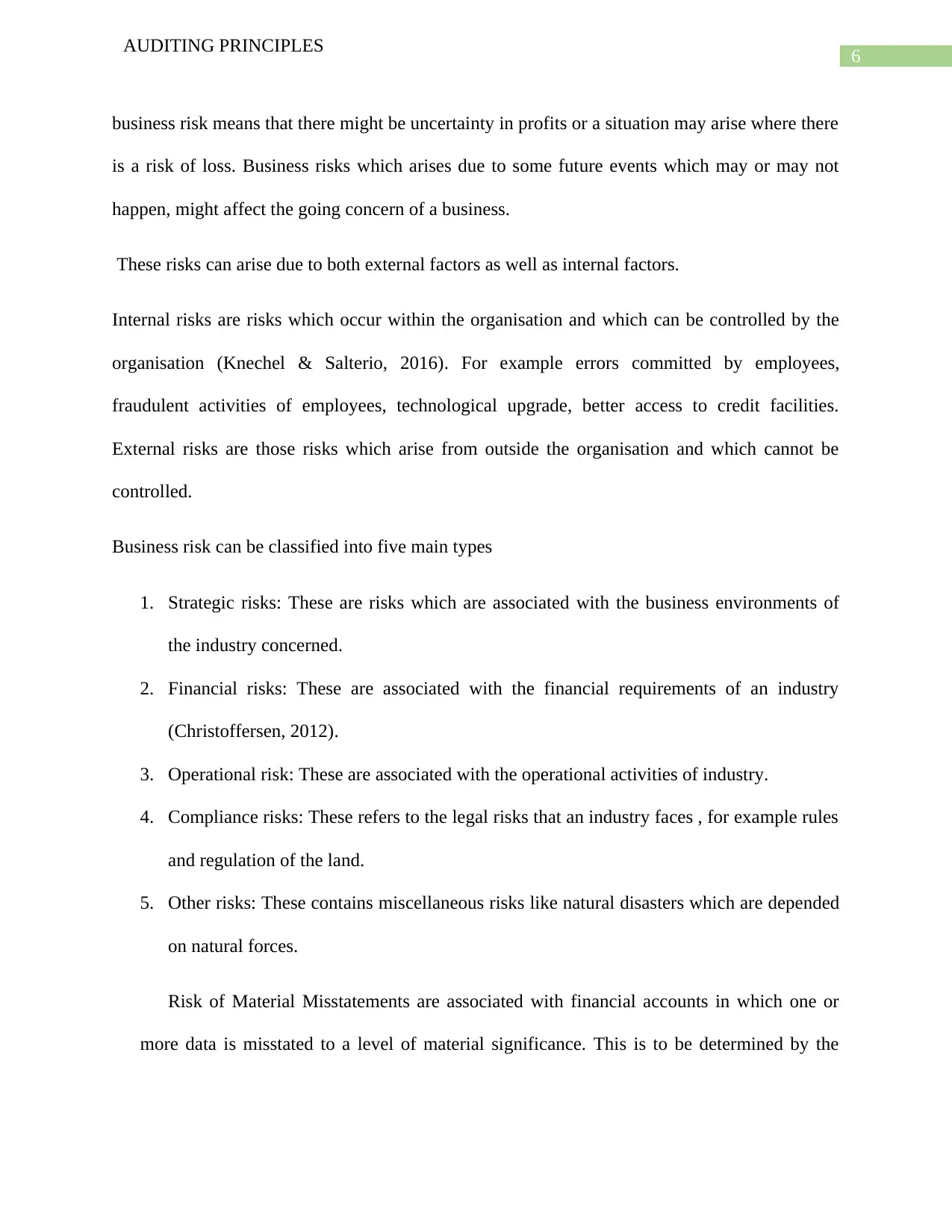
6
AUDITING PRINCIPLES
business risk means that there might be uncertainty in profits or a situation may arise where there
is a risk of loss. Business risks which arises due to some future events which may or may not
happen, might affect the going concern of a business.
These risks can arise due to both external factors as well as internal factors.
Internal risks are risks which occur within the organisation and which can be controlled by the
organisation (Knechel & Salterio, 2016). For example errors committed by employees,
fraudulent activities of employees, technological upgrade, better access to credit facilities.
External risks are those risks which arise from outside the organisation and which cannot be
controlled.
Business risk can be classified into five main types
1. Strategic risks: These are risks which are associated with the business environments of
the industry concerned.
2. Financial risks: These are associated with the financial requirements of an industry
(Christoffersen, 2012).
3. Operational risk: These are associated with the operational activities of industry.
4. Compliance risks: These refers to the legal risks that an industry faces , for example rules
and regulation of the land.
5. Other risks: These contains miscellaneous risks like natural disasters which are depended
on natural forces.
Risk of Material Misstatements are associated with financial accounts in which one or
more data is misstated to a level of material significance. This is to be determined by the
AUDITING PRINCIPLES
business risk means that there might be uncertainty in profits or a situation may arise where there
is a risk of loss. Business risks which arises due to some future events which may or may not
happen, might affect the going concern of a business.
These risks can arise due to both external factors as well as internal factors.
Internal risks are risks which occur within the organisation and which can be controlled by the
organisation (Knechel & Salterio, 2016). For example errors committed by employees,
fraudulent activities of employees, technological upgrade, better access to credit facilities.
External risks are those risks which arise from outside the organisation and which cannot be
controlled.
Business risk can be classified into five main types
1. Strategic risks: These are risks which are associated with the business environments of
the industry concerned.
2. Financial risks: These are associated with the financial requirements of an industry
(Christoffersen, 2012).
3. Operational risk: These are associated with the operational activities of industry.
4. Compliance risks: These refers to the legal risks that an industry faces , for example rules
and regulation of the land.
5. Other risks: These contains miscellaneous risks like natural disasters which are depended
on natural forces.
Risk of Material Misstatements are associated with financial accounts in which one or
more data is misstated to a level of material significance. This is to be determined by the
Paraphrase This Document
Need a fresh take? Get an instant paraphrase of this document with our AI Paraphraser
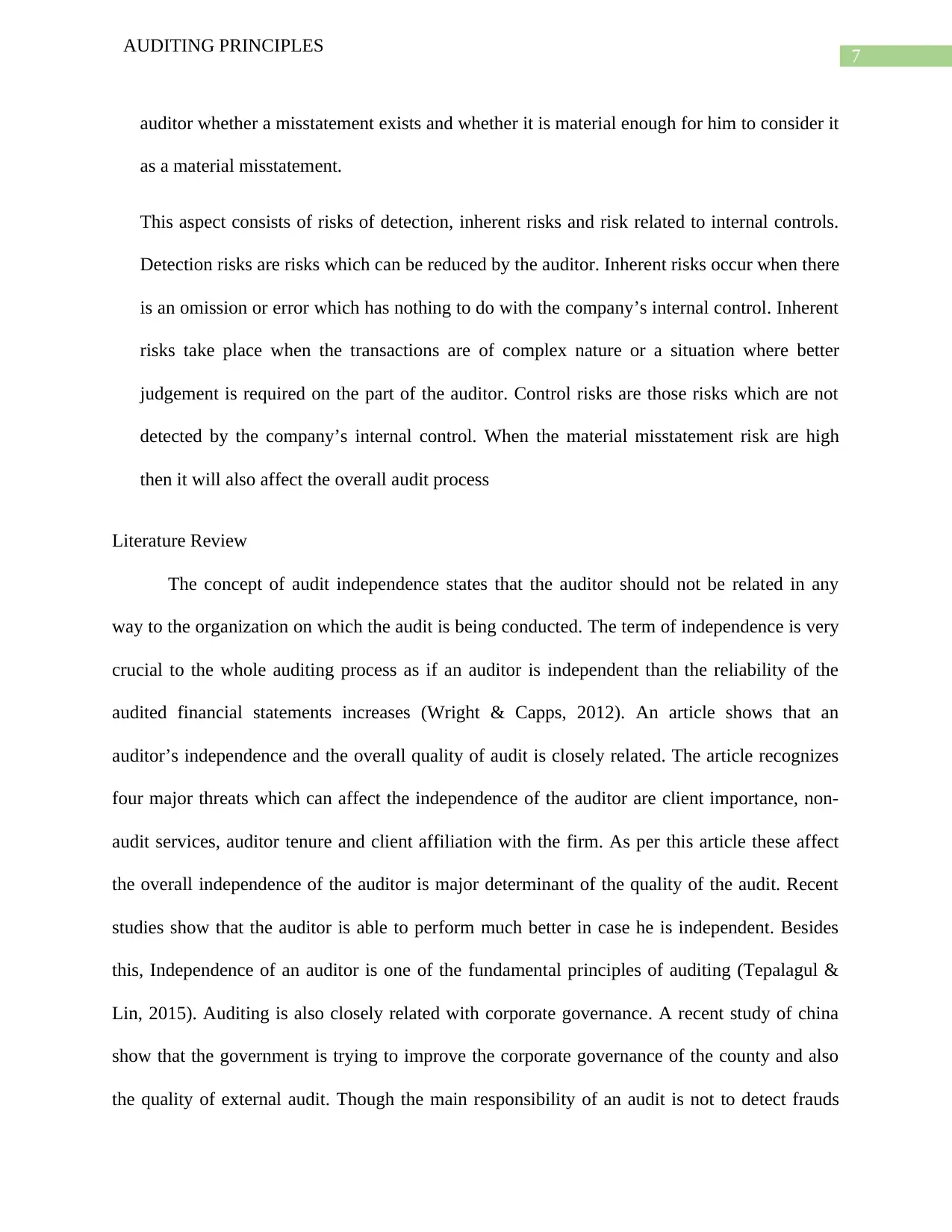
7
AUDITING PRINCIPLES
auditor whether a misstatement exists and whether it is material enough for him to consider it
as a material misstatement.
This aspect consists of risks of detection, inherent risks and risk related to internal controls.
Detection risks are risks which can be reduced by the auditor. Inherent risks occur when there
is an omission or error which has nothing to do with the company’s internal control. Inherent
risks take place when the transactions are of complex nature or a situation where better
judgement is required on the part of the auditor. Control risks are those risks which are not
detected by the company’s internal control. When the material misstatement risk are high
then it will also affect the overall audit process
Literature Review
The concept of audit independence states that the auditor should not be related in any
way to the organization on which the audit is being conducted. The term of independence is very
crucial to the whole auditing process as if an auditor is independent than the reliability of the
audited financial statements increases (Wright & Capps, 2012). An article shows that an
auditor’s independence and the overall quality of audit is closely related. The article recognizes
four major threats which can affect the independence of the auditor are client importance, non-
audit services, auditor tenure and client affiliation with the firm. As per this article these affect
the overall independence of the auditor is major determinant of the quality of the audit. Recent
studies show that the auditor is able to perform much better in case he is independent. Besides
this, Independence of an auditor is one of the fundamental principles of auditing (Tepalagul &
Lin, 2015). Auditing is also closely related with corporate governance. A recent study of china
show that the government is trying to improve the corporate governance of the county and also
the quality of external audit. Though the main responsibility of an audit is not to detect frauds
AUDITING PRINCIPLES
auditor whether a misstatement exists and whether it is material enough for him to consider it
as a material misstatement.
This aspect consists of risks of detection, inherent risks and risk related to internal controls.
Detection risks are risks which can be reduced by the auditor. Inherent risks occur when there
is an omission or error which has nothing to do with the company’s internal control. Inherent
risks take place when the transactions are of complex nature or a situation where better
judgement is required on the part of the auditor. Control risks are those risks which are not
detected by the company’s internal control. When the material misstatement risk are high
then it will also affect the overall audit process
Literature Review
The concept of audit independence states that the auditor should not be related in any
way to the organization on which the audit is being conducted. The term of independence is very
crucial to the whole auditing process as if an auditor is independent than the reliability of the
audited financial statements increases (Wright & Capps, 2012). An article shows that an
auditor’s independence and the overall quality of audit is closely related. The article recognizes
four major threats which can affect the independence of the auditor are client importance, non-
audit services, auditor tenure and client affiliation with the firm. As per this article these affect
the overall independence of the auditor is major determinant of the quality of the audit. Recent
studies show that the auditor is able to perform much better in case he is independent. Besides
this, Independence of an auditor is one of the fundamental principles of auditing (Tepalagul &
Lin, 2015). Auditing is also closely related with corporate governance. A recent study of china
show that the government is trying to improve the corporate governance of the county and also
the quality of external audit. Though the main responsibility of an audit is not to detect frauds
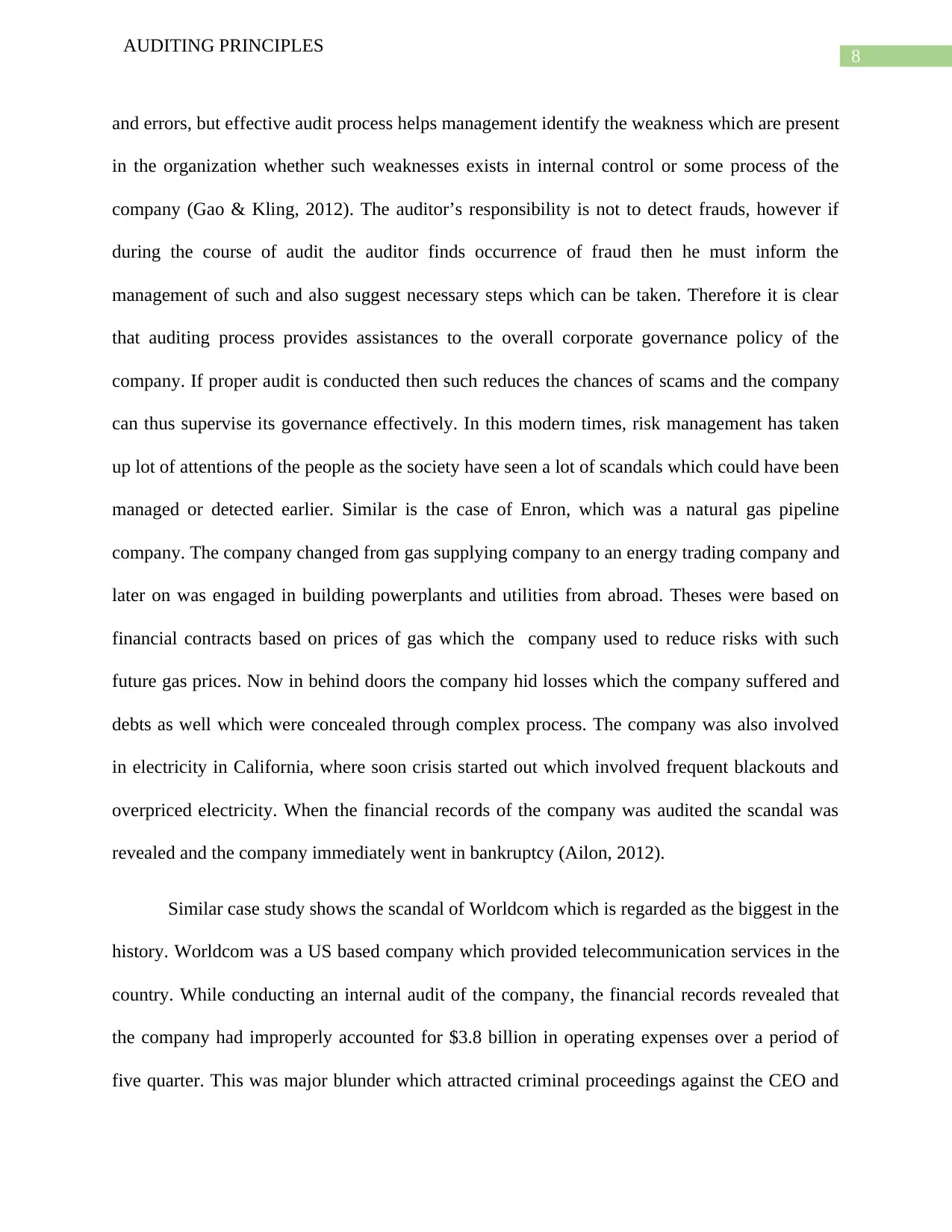
8
AUDITING PRINCIPLES
and errors, but effective audit process helps management identify the weakness which are present
in the organization whether such weaknesses exists in internal control or some process of the
company (Gao & Kling, 2012). The auditor’s responsibility is not to detect frauds, however if
during the course of audit the auditor finds occurrence of fraud then he must inform the
management of such and also suggest necessary steps which can be taken. Therefore it is clear
that auditing process provides assistances to the overall corporate governance policy of the
company. If proper audit is conducted then such reduces the chances of scams and the company
can thus supervise its governance effectively. In this modern times, risk management has taken
up lot of attentions of the people as the society have seen a lot of scandals which could have been
managed or detected earlier. Similar is the case of Enron, which was a natural gas pipeline
company. The company changed from gas supplying company to an energy trading company and
later on was engaged in building powerplants and utilities from abroad. Theses were based on
financial contracts based on prices of gas which the company used to reduce risks with such
future gas prices. Now in behind doors the company hid losses which the company suffered and
debts as well which were concealed through complex process. The company was also involved
in electricity in California, where soon crisis started out which involved frequent blackouts and
overpriced electricity. When the financial records of the company was audited the scandal was
revealed and the company immediately went in bankruptcy (Ailon, 2012).
Similar case study shows the scandal of Worldcom which is regarded as the biggest in the
history. Worldcom was a US based company which provided telecommunication services in the
country. While conducting an internal audit of the company, the financial records revealed that
the company had improperly accounted for $3.8 billion in operating expenses over a period of
five quarter. This was major blunder which attracted criminal proceedings against the CEO and
AUDITING PRINCIPLES
and errors, but effective audit process helps management identify the weakness which are present
in the organization whether such weaknesses exists in internal control or some process of the
company (Gao & Kling, 2012). The auditor’s responsibility is not to detect frauds, however if
during the course of audit the auditor finds occurrence of fraud then he must inform the
management of such and also suggest necessary steps which can be taken. Therefore it is clear
that auditing process provides assistances to the overall corporate governance policy of the
company. If proper audit is conducted then such reduces the chances of scams and the company
can thus supervise its governance effectively. In this modern times, risk management has taken
up lot of attentions of the people as the society have seen a lot of scandals which could have been
managed or detected earlier. Similar is the case of Enron, which was a natural gas pipeline
company. The company changed from gas supplying company to an energy trading company and
later on was engaged in building powerplants and utilities from abroad. Theses were based on
financial contracts based on prices of gas which the company used to reduce risks with such
future gas prices. Now in behind doors the company hid losses which the company suffered and
debts as well which were concealed through complex process. The company was also involved
in electricity in California, where soon crisis started out which involved frequent blackouts and
overpriced electricity. When the financial records of the company was audited the scandal was
revealed and the company immediately went in bankruptcy (Ailon, 2012).
Similar case study shows the scandal of Worldcom which is regarded as the biggest in the
history. Worldcom was a US based company which provided telecommunication services in the
country. While conducting an internal audit of the company, the financial records revealed that
the company had improperly accounted for $3.8 billion in operating expenses over a period of
five quarter. This was major blunder which attracted criminal proceedings against the CEO and
⊘ This is a preview!⊘
Do you want full access?
Subscribe today to unlock all pages.

Trusted by 1+ million students worldwide
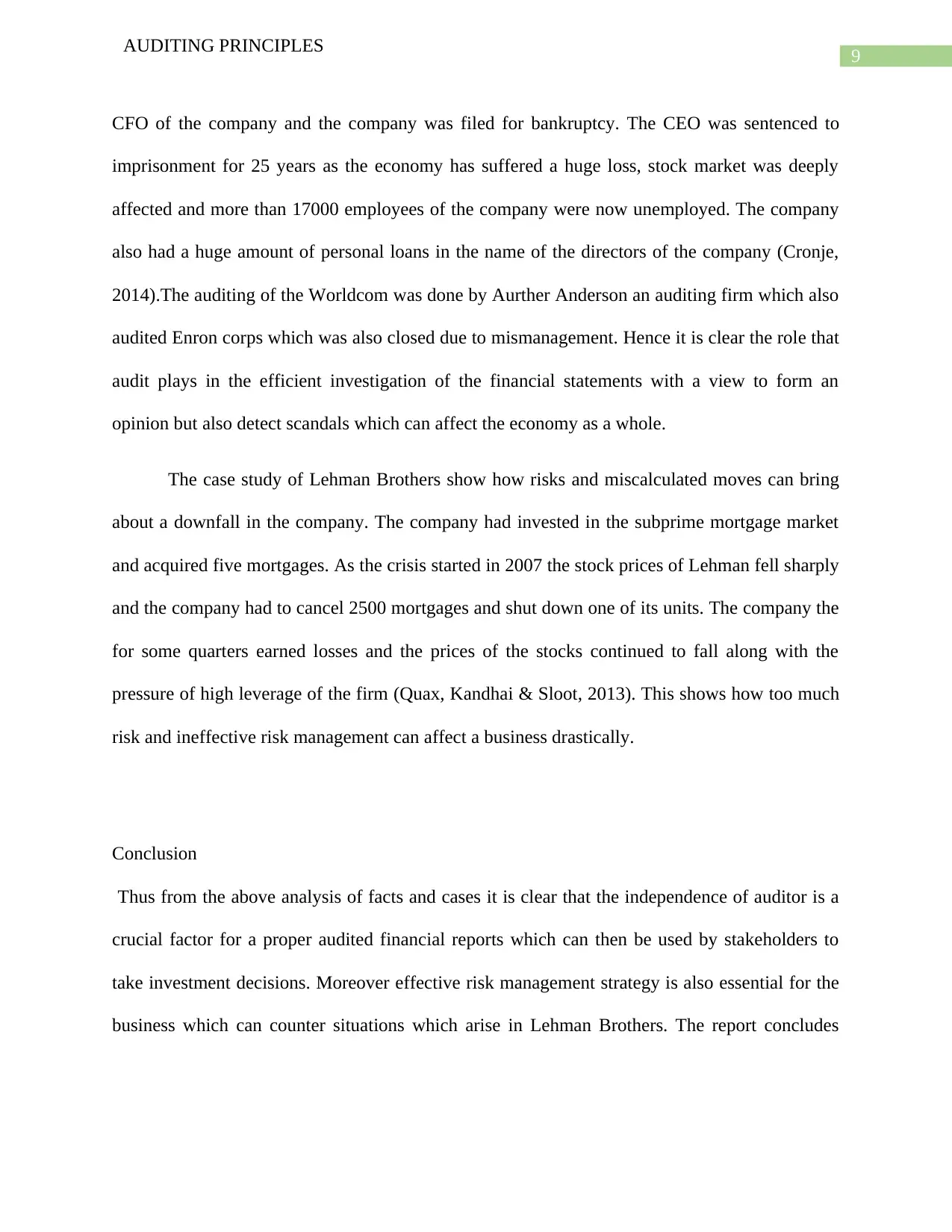
9
AUDITING PRINCIPLES
CFO of the company and the company was filed for bankruptcy. The CEO was sentenced to
imprisonment for 25 years as the economy has suffered a huge loss, stock market was deeply
affected and more than 17000 employees of the company were now unemployed. The company
also had a huge amount of personal loans in the name of the directors of the company (Cronje,
2014).The auditing of the Worldcom was done by Aurther Anderson an auditing firm which also
audited Enron corps which was also closed due to mismanagement. Hence it is clear the role that
audit plays in the efficient investigation of the financial statements with a view to form an
opinion but also detect scandals which can affect the economy as a whole.
The case study of Lehman Brothers show how risks and miscalculated moves can bring
about a downfall in the company. The company had invested in the subprime mortgage market
and acquired five mortgages. As the crisis started in 2007 the stock prices of Lehman fell sharply
and the company had to cancel 2500 mortgages and shut down one of its units. The company the
for some quarters earned losses and the prices of the stocks continued to fall along with the
pressure of high leverage of the firm (Quax, Kandhai & Sloot, 2013). This shows how too much
risk and ineffective risk management can affect a business drastically.
Conclusion
Thus from the above analysis of facts and cases it is clear that the independence of auditor is a
crucial factor for a proper audited financial reports which can then be used by stakeholders to
take investment decisions. Moreover effective risk management strategy is also essential for the
business which can counter situations which arise in Lehman Brothers. The report concludes
AUDITING PRINCIPLES
CFO of the company and the company was filed for bankruptcy. The CEO was sentenced to
imprisonment for 25 years as the economy has suffered a huge loss, stock market was deeply
affected and more than 17000 employees of the company were now unemployed. The company
also had a huge amount of personal loans in the name of the directors of the company (Cronje,
2014).The auditing of the Worldcom was done by Aurther Anderson an auditing firm which also
audited Enron corps which was also closed due to mismanagement. Hence it is clear the role that
audit plays in the efficient investigation of the financial statements with a view to form an
opinion but also detect scandals which can affect the economy as a whole.
The case study of Lehman Brothers show how risks and miscalculated moves can bring
about a downfall in the company. The company had invested in the subprime mortgage market
and acquired five mortgages. As the crisis started in 2007 the stock prices of Lehman fell sharply
and the company had to cancel 2500 mortgages and shut down one of its units. The company the
for some quarters earned losses and the prices of the stocks continued to fall along with the
pressure of high leverage of the firm (Quax, Kandhai & Sloot, 2013). This shows how too much
risk and ineffective risk management can affect a business drastically.
Conclusion
Thus from the above analysis of facts and cases it is clear that the independence of auditor is a
crucial factor for a proper audited financial reports which can then be used by stakeholders to
take investment decisions. Moreover effective risk management strategy is also essential for the
business which can counter situations which arise in Lehman Brothers. The report concludes
Paraphrase This Document
Need a fresh take? Get an instant paraphrase of this document with our AI Paraphraser
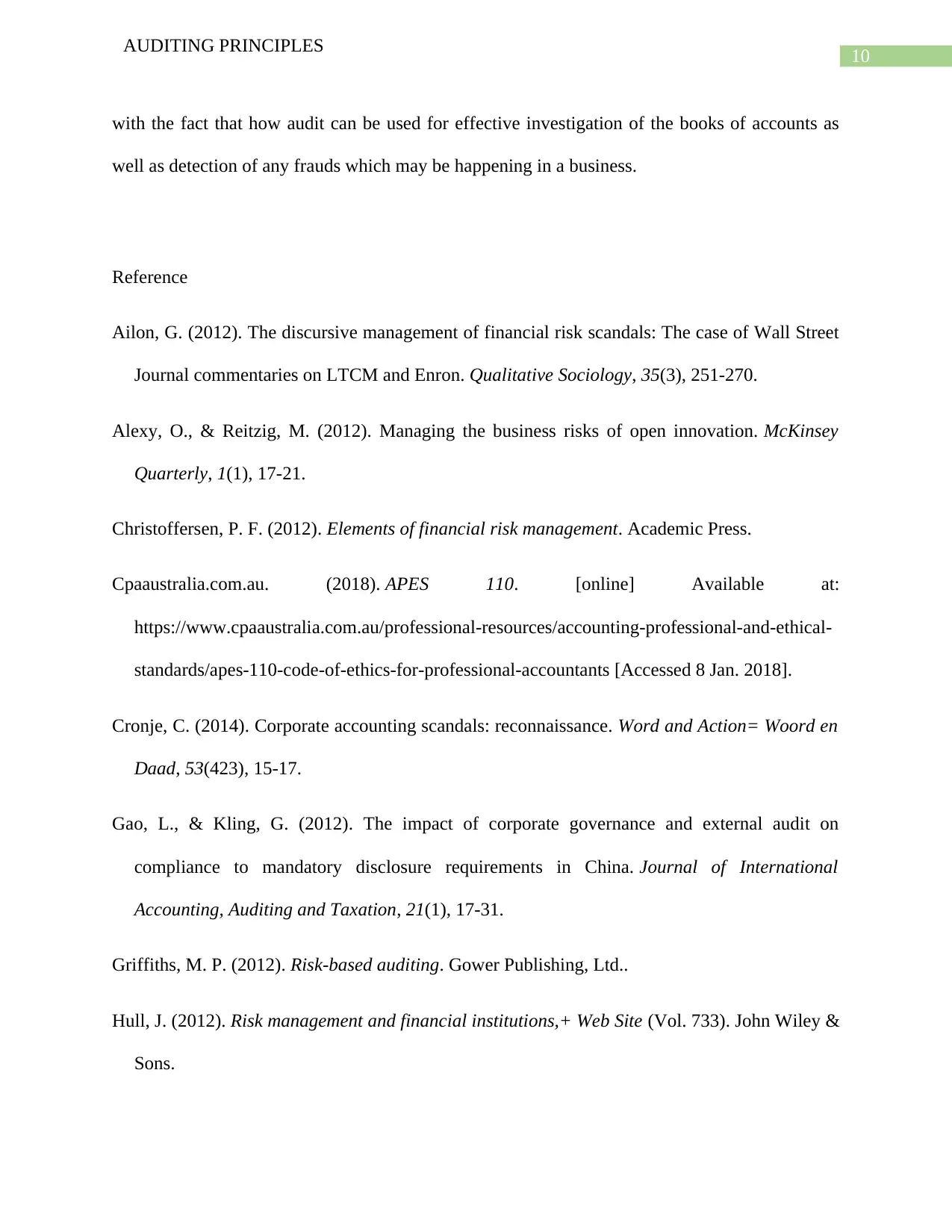
10
AUDITING PRINCIPLES
with the fact that how audit can be used for effective investigation of the books of accounts as
well as detection of any frauds which may be happening in a business.
Reference
Ailon, G. (2012). The discursive management of financial risk scandals: The case of Wall Street
Journal commentaries on LTCM and Enron. Qualitative Sociology, 35(3), 251-270.
Alexy, O., & Reitzig, M. (2012). Managing the business risks of open innovation. McKinsey
Quarterly, 1(1), 17-21.
Christoffersen, P. F. (2012). Elements of financial risk management. Academic Press.
Cpaaustralia.com.au. (2018). APES 110. [online] Available at:
https://www.cpaaustralia.com.au/professional-resources/accounting-professional-and-ethical-
standards/apes-110-code-of-ethics-for-professional-accountants [Accessed 8 Jan. 2018].
Cronje, C. (2014). Corporate accounting scandals: reconnaissance. Word and Action= Woord en
Daad, 53(423), 15-17.
Gao, L., & Kling, G. (2012). The impact of corporate governance and external audit on
compliance to mandatory disclosure requirements in China. Journal of International
Accounting, Auditing and Taxation, 21(1), 17-31.
Griffiths, M. P. (2012). Risk-based auditing. Gower Publishing, Ltd..
Hull, J. (2012). Risk management and financial institutions,+ Web Site (Vol. 733). John Wiley &
Sons.
AUDITING PRINCIPLES
with the fact that how audit can be used for effective investigation of the books of accounts as
well as detection of any frauds which may be happening in a business.
Reference
Ailon, G. (2012). The discursive management of financial risk scandals: The case of Wall Street
Journal commentaries on LTCM and Enron. Qualitative Sociology, 35(3), 251-270.
Alexy, O., & Reitzig, M. (2012). Managing the business risks of open innovation. McKinsey
Quarterly, 1(1), 17-21.
Christoffersen, P. F. (2012). Elements of financial risk management. Academic Press.
Cpaaustralia.com.au. (2018). APES 110. [online] Available at:
https://www.cpaaustralia.com.au/professional-resources/accounting-professional-and-ethical-
standards/apes-110-code-of-ethics-for-professional-accountants [Accessed 8 Jan. 2018].
Cronje, C. (2014). Corporate accounting scandals: reconnaissance. Word and Action= Woord en
Daad, 53(423), 15-17.
Gao, L., & Kling, G. (2012). The impact of corporate governance and external audit on
compliance to mandatory disclosure requirements in China. Journal of International
Accounting, Auditing and Taxation, 21(1), 17-31.
Griffiths, M. P. (2012). Risk-based auditing. Gower Publishing, Ltd..
Hull, J. (2012). Risk management and financial institutions,+ Web Site (Vol. 733). John Wiley &
Sons.
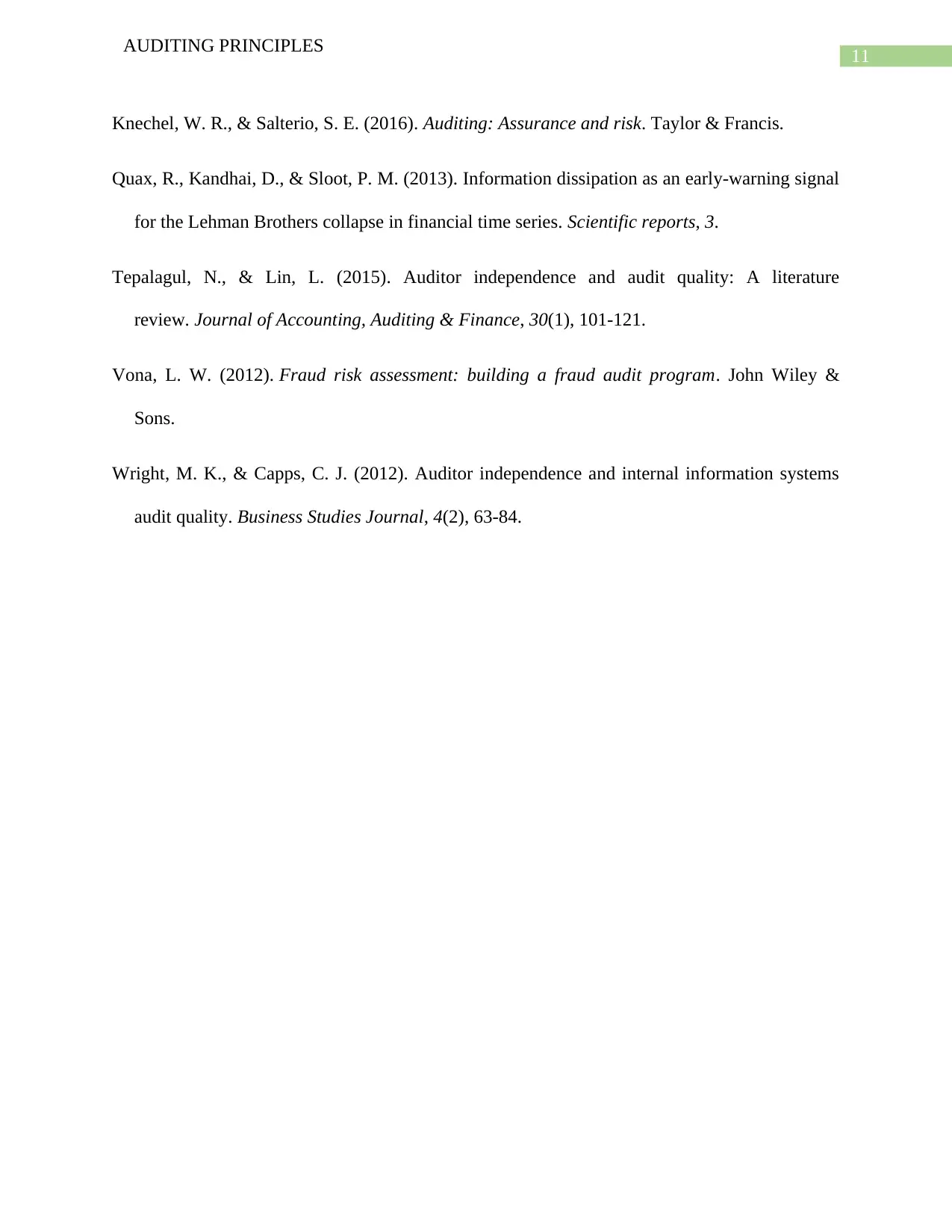
11
AUDITING PRINCIPLES
Knechel, W. R., & Salterio, S. E. (2016). Auditing: Assurance and risk. Taylor & Francis.
Quax, R., Kandhai, D., & Sloot, P. M. (2013). Information dissipation as an early-warning signal
for the Lehman Brothers collapse in financial time series. Scientific reports, 3.
Tepalagul, N., & Lin, L. (2015). Auditor independence and audit quality: A literature
review. Journal of Accounting, Auditing & Finance, 30(1), 101-121.
Vona, L. W. (2012). Fraud risk assessment: building a fraud audit program. John Wiley &
Sons.
Wright, M. K., & Capps, C. J. (2012). Auditor independence and internal information systems
audit quality. Business Studies Journal, 4(2), 63-84.
AUDITING PRINCIPLES
Knechel, W. R., & Salterio, S. E. (2016). Auditing: Assurance and risk. Taylor & Francis.
Quax, R., Kandhai, D., & Sloot, P. M. (2013). Information dissipation as an early-warning signal
for the Lehman Brothers collapse in financial time series. Scientific reports, 3.
Tepalagul, N., & Lin, L. (2015). Auditor independence and audit quality: A literature
review. Journal of Accounting, Auditing & Finance, 30(1), 101-121.
Vona, L. W. (2012). Fraud risk assessment: building a fraud audit program. John Wiley &
Sons.
Wright, M. K., & Capps, C. J. (2012). Auditor independence and internal information systems
audit quality. Business Studies Journal, 4(2), 63-84.
⊘ This is a preview!⊘
Do you want full access?
Subscribe today to unlock all pages.

Trusted by 1+ million students worldwide
1 out of 12
Related Documents
Your All-in-One AI-Powered Toolkit for Academic Success.
+13062052269
info@desklib.com
Available 24*7 on WhatsApp / Email
![[object Object]](/_next/static/media/star-bottom.7253800d.svg)
Unlock your academic potential
Copyright © 2020–2026 A2Z Services. All Rights Reserved. Developed and managed by ZUCOL.




